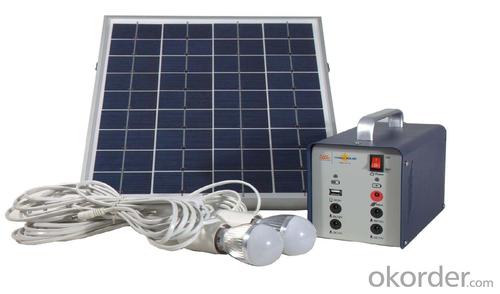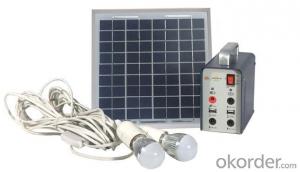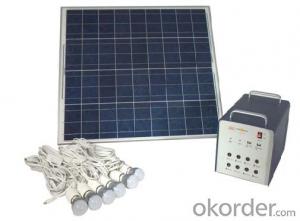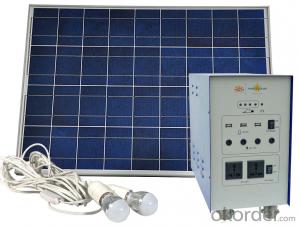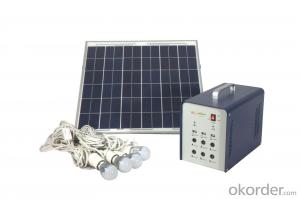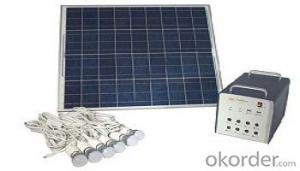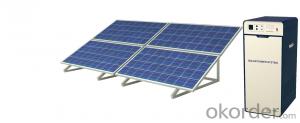Solar Energy Systems Limited Home Off-Grid Solar Power System DC Lighting JS-SPS-15
- Loading Port:
- Tianjin
- Payment Terms:
- TT OR LC
- Min Order Qty:
- 10 set
- Supply Capability:
- 10000 set/month
OKorder Service Pledge
Quality Product, Order Online Tracking, Timely Delivery
OKorder Financial Service
Credit Rating, Credit Services, Credit Purchasing
You Might Also Like
Off-grid Solar Power System
General Introduction
Solar power system provides alternating current and direct current, which is produced by the modules transforming solar power into power, to home lighting, household appliance and other DC appliance, such as cell phone and laptop.
Solar power system is widely used in area lack of power, for example house power supplying, monitoring, communication base, fire prevention in forest area, pasture and meadow, aquaculture etc.
We are dedicated to provide high quality off-grid PV products and systems to customers and has received a series of certificate, including ISO9001, TUV, UL, CE, CQC and RoHS.
Solar DC Lighting System
Multiple protection system, safe and reliable performance.
Integrated and portable design, easy operation.
DC5V, DC12V, AC220V output, wide range application.
Clean engergy, cycle use.
General Introduction
Solar power system provides alternating current and direct current, which is produced by the modules transforming solar power into power, to home lighting, household appliance and other DC appliance, such as cell phone and laptop.
Solar power system is widely used in area lack of power, for example house power supplying, monitoring, communication base, fire prevention in forest area, pasture and meadow, aquaculture etc.
We are dedicated to provide high quality off-grid PV products and systems to customers and has received a series of certificate, including ISO9001, TUV, UL, CE, CQC and RoHS.
Solar DC Lighting System
Multiple protection system, safe and reliable performance.
Integrated and portable design, easy operation.
DC5V, DC12V, AC220V output, wide range application.
Clean engergy, cycle use.
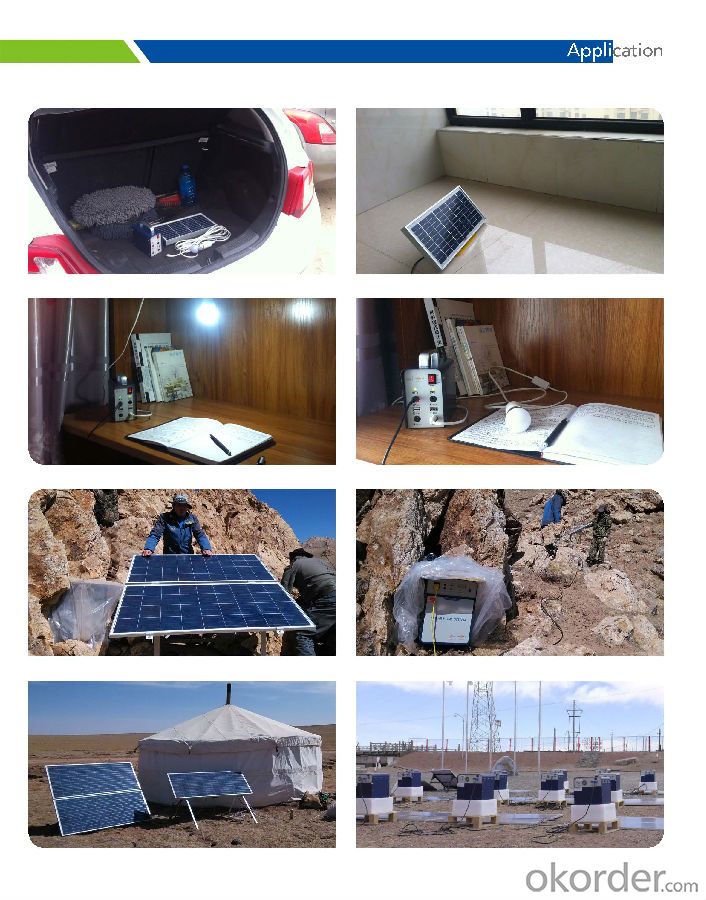
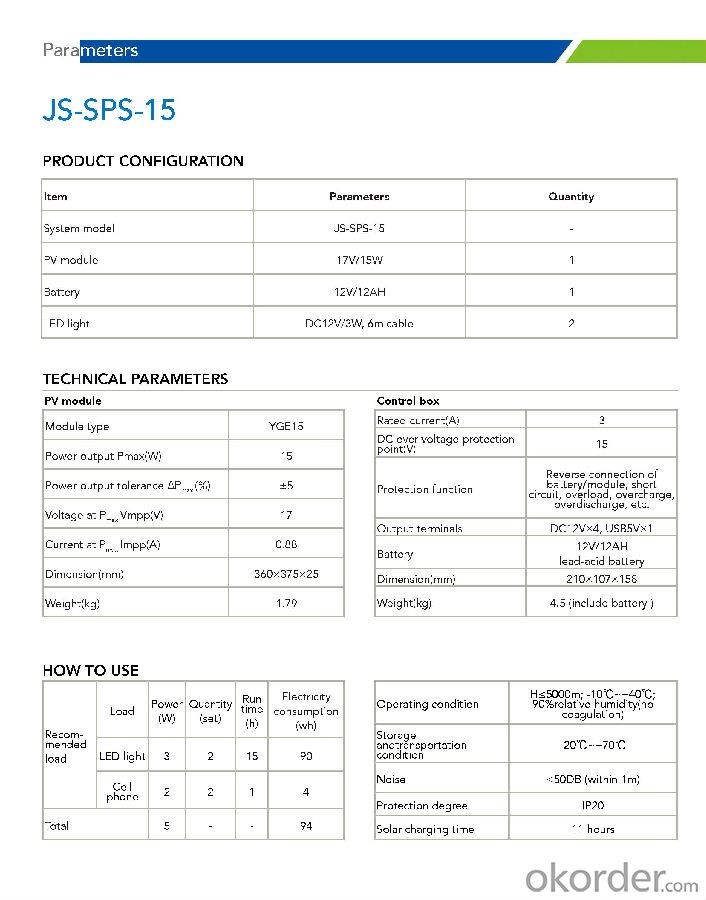
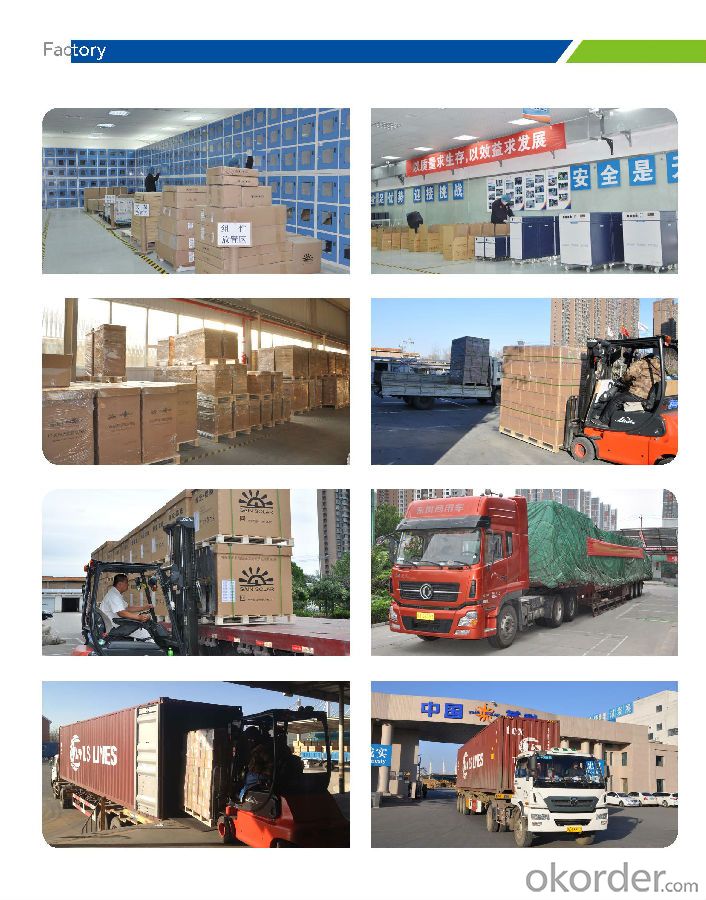
- Q: How do solar energy systems impact the electrical grid?
- Solar energy systems can have a positive impact on the electrical grid by reducing the overall demand for electricity and decreasing the reliance on fossil fuel-based power generation. When connected to the grid, solar systems can feed excess electricity back into the grid, helping to stabilize and balance the supply-demand dynamics. However, the intermittent nature of solar power may pose challenges for grid operators in managing fluctuations in generation, necessitating grid upgrades and energy storage solutions to ensure grid stability and reliability.
- Q: What is the impact of electromagnetic interference on solar energy system performance?
- Electromagnetic interference can have a negative impact on the performance of solar energy systems. It can cause disruptions and fluctuations in the electrical signals and data transmission within the system, leading to reduced efficiency and reliability. Additionally, electromagnetic interference can interfere with the proper functioning of inverters and other critical components, potentially causing system failures and downtime. Therefore, it is crucial to implement proper shielding and mitigation measures to minimize the impact of electromagnetic interference on solar energy system performance.
- Q: Are there any insurance considerations for solar energy systems?
- Yes, there are insurance considerations for solar energy systems. Installing a solar energy system typically requires additional insurance coverage to protect against any potential damages or accidents. This can include coverage for the solar panels themselves, liability coverage for any injuries or property damage caused by the system, and potential business interruption coverage in case the system fails or is damaged. It is important for homeowners, businesses, and solar energy providers to consult with their insurance providers to ensure they have the appropriate coverage in place.
- Q: Can solar energy systems be used in areas with limited access to solar energy conferences and expos?
- Yes, solar energy systems can be used in areas with limited access to solar energy conferences and expos. While conferences and expos provide valuable information and networking opportunities, they are not essential for the installation and functioning of solar energy systems. Technicians and experts can still design and install solar systems based on site assessments and available resources. Additionally, there are online resources and virtual conferences that can help disseminate knowledge and provide updates on the latest advancements in solar energy technology.
- Q: Can solar energy systems be used for desalination of water?
- Yes, solar energy systems can be used for the desalination of water. Solar desalination is a sustainable and environmentally friendly method that uses solar energy to power the desalination process, converting seawater or brackish water into clean, fresh water suitable for consumption or irrigation. By utilizing solar panels to generate electricity, the energy can be used to power various desalination technologies such as reverse osmosis or solar stills, making it an efficient and renewable solution to address water scarcity in coastal or arid regions.
- Q: Do solar energy systems require a lot of maintenance?
- Solar energy systems require minimal maintenance and operate quietly and efficiently once installed. The primary maintenance task involves regular cleaning of the solar panels to ensure optimal performance, which can be easily accomplished using a soft brush or cloth, and occasionally water. Additionally, it is crucial to regularly monitor the system's performance through an online monitoring system to detect any potential issues or inefficiencies. However, compared to other energy systems, solar energy systems have fewer moving parts, reducing the need for maintenance and associated costs. In summary, solar energy systems are renowned for their reliability and long lifespan, making them a low-maintenance and cost-effective solution for generating clean and sustainable energy.
- Q: Are there any regulations or permits required for installing solar energy systems?
- Yes, there are regulations and permits required for installing solar energy systems. The specific requirements vary depending on the location and jurisdiction, as regulations are set at the local, state, and national levels. These regulations and permits are put in place to ensure that the installation of solar energy systems is safe, compliant with building codes, and meets local zoning requirements. Typically, a building permit is required to install a solar energy system. This permit ensures that the installation is done correctly and follows all necessary safety guidelines. The permit process usually involves submitting detailed plans and documentation, including structural engineering reports and electrical diagrams. These documents are reviewed by the local building department to ensure compliance with applicable codes and regulations. In addition to building permits, there may be other permits or approvals required for solar energy systems. This could include electrical permits, zoning permits, or even historic preservation approvals in certain areas. It is important to consult with the relevant authorities and obtain all necessary permits before installing a solar energy system to avoid any legal or safety issues. Furthermore, some jurisdictions may have specific regulations regarding the size, placement, and design of solar energy systems. These regulations are typically aimed at preserving the aesthetics of the area and ensuring the systems do not pose any risks or nuisances to neighboring properties. It is worth noting that regulations and permit requirements are constantly evolving and can vary greatly from one jurisdiction to another. Therefore, it is advisable to consult with local authorities or hire a professional solar energy installer who is familiar with the local regulations to ensure compliance throughout the installation process.
- Q: Can a solar energy system be connected to the grid?
- Yes, a solar energy system can be connected to the grid. In fact, most solar installations are designed to be grid-connected, allowing excess electricity to be fed back into the grid and reducing reliance on non-renewable energy sources. This connection also enables homeowners and businesses to benefit from net metering programs, where they receive credits or payments for the surplus electricity they generate.
- Q: What is the impact of snow cover on the performance of solar panels?
- The impact of snow cover on the performance of solar panels can vary depending on the severity and duration of the snowfall, as well as the design and tilt angle of the panels. When solar panels are covered in snow, they are unable to generate electricity as effectively. The snow blocks the sunlight from reaching the panel's surface, reducing the amount of energy that can be converted. This can lead to a decrease in the overall power output of the solar system during the snowy period. However, it is important to note that most solar panels are designed to have a tilt angle that allows for natural snow shedding. When the panels are installed at an angle, the snow can slide off more easily, exposing the surface and allowing sunlight to once again reach the photovoltaic cells. In regions with regular snowfall, it is common for solar panel installations to have a steeper tilt angle to facilitate snow removal. Additionally, some solar panels are equipped with anti-reflective coatings or self-cleaning features that can help reduce the impact of snow cover. These coatings or features can prevent snow from sticking to the surface, allowing for faster snow removal and improved performance. It is worth mentioning that snow cover can also have a positive impact on solar panels in certain cases. A thin layer of snow can act as an insulating layer, helping to retain heat and potentially increase the efficiency of the panels. However, this effect is generally minimal and limited to specific conditions. Overall, while snow cover can temporarily reduce the performance of solar panels, the impact can be mitigated through proper installation techniques and design considerations. In areas with regular snowfall, it is important to consider the tilt angle, anti-reflective coatings, and self-cleaning features to ensure optimal performance throughout the year.
- Q: Can a solar energy system be installed on a public park or recreational area?
- Certainly, it is possible to install a solar energy system on a public park or recreational area. In truth, implementing solar panels in such locations can serve as an excellent means of promoting sustainability and renewable energy. Public parks and recreational areas frequently possess expansive, sunlit spaces, rendering them perfect sites for solar panel installation. These systems have the capability to produce clean, renewable energy and power numerous park facilities, including lighting, water fountains, and even charging stations for electric vehicles. Furthermore, the installation of solar panels in public parks can present a valuable educational opportunity for visitors to acquire knowledge about the advantages of solar energy and the significance of environmental preservation. Furthermore, these systems possess the potential to diminish the park's dependence on fossil fuels and diminish its carbon footprint, thus contributing to a more environmentally friendly and sustainable future.
Send your message to us
Solar Energy Systems Limited Home Off-Grid Solar Power System DC Lighting JS-SPS-15
- Loading Port:
- Tianjin
- Payment Terms:
- TT OR LC
- Min Order Qty:
- 10 set
- Supply Capability:
- 10000 set/month
OKorder Service Pledge
Quality Product, Order Online Tracking, Timely Delivery
OKorder Financial Service
Credit Rating, Credit Services, Credit Purchasing
Similar products
Hot products
Hot Searches
Related keywords



